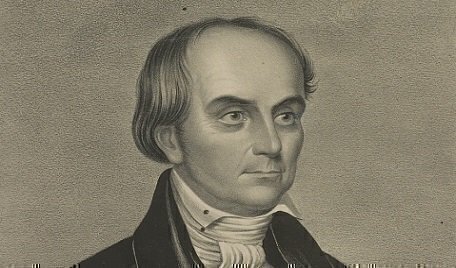[ad_1]
Daniel Webster was one of many seminal figures of nineteenth century America as an orator and politician. Maybe much less recognized is Webster’s affect on the Supreme Court docket, and particularly the Marshall Court docket.

Born on January 18, 1782 in New Hampshire, Webster was an legal professional earlier than becoming a member of Congress in 1813. Throughout his practically 30 years in authorities, Webster served as Secretary of State 3 times, twice within the Senate and twice within the Home. In the present day, he’s finest remembered as the best public speaker of his time, a founding father of the Whig Get together, and for his controversial position within the 1850 compromise that led to fugitive slave legal guidelines – and the Whig Get together’s dying.
However by means of his public profession, Webster practiced the legislation and argued circumstances in entrance of the Supreme Court docket and different courts as much as his dying in 1852. The truth is, he argued greater than 200 circumstances in entrance of the Justices and was concerned in a number of landmark circumstances that solidified the facility of the federal authorities.
The late historical past professor Maurice G. Baxter’s ebook from 1966, Daniel Webster & The Supreme Court docket, presents a great have a look at Webster’s relationship with the Court docket. Between 1812 and 1852, a interval of 40 years, “no lawyer had extra impact on america Supreme Court docket, that wondrous engine of nationwide energy, than Daniel Webster,” Baxter mentioned.
Webster’s contributions together with arguing circumstances about interstate commerce, the rights of firms, and the boundaries of frequent legislation – all issues that had been unsettled in the course of the Court docket’s earliest interval. And whereas Webster gained nice fame for his Supreme Court docket arguments, Baxter mentioned most of his courtroom work was outdoors Washington. Webster wasn’t generally known as an important authorized scholar, however he studied scholarly works, together with these from his buddy, Justice Joseph Story. He was very effectively ready, with detailed authorized briefs that he wrote along side his associates.
It additionally wouldn’t be uncommon for Webster to look in Congress and argue a case on the Supreme Court docket on the identical day, to capability crowds wanting to listen to “the Defender of the Structure.”
Webster is most related to three landmark Supreme Court docket selections. He defended his alma mater, Dartmouth School, within the 1819 corporate-law case, Dartmouth School v. Woodward. Within the newly refurbished Supreme Court docket chambers, Webster argued that it was unconstitutional for the state of New Hampshire to make use of laws to position Dartmouth, a personal faculty, underneath its management.
Webster’s four-hour oratory was so robust that after he stared at Chief Justice John Marshall at its finish, most individuals within the courtroom had been in tears, in keeping with eyewitnesses. Marshall, in his majority opinion, agreed with Webster that the Structure’s Contracts Clause protected non-public firms like Dartmouth.
Webster additionally was one of many legal professionals within the landmark case McCulloch v. Maryland, in 1819. The state of Maryland had positioned a tax on the Second Financial institution of america department in that state. Webster refuted Maryland’s claims that the financial institution was unconstitutional and that the state may tax it anyway. Throughout opening arguments directed at Chief Justice Marshall, Webster mentioned the federal Structure was “the supreme legislation of the land,” echoing older arguments made by Alexander Hamilton. Then, Webster made his personal case that the Maryland’s skill to position a levy on a federal financial institution would result in limitless state taxing energy and an influence to destroy federal establishments. Marshall made the identical arguments within the unanimous choice that bolstered federal energy underneath the Supremacy Clause.
In Gibbons v. Ogden (1824), Webster argued for the facility of Congress to control commerce between the states. After the steamboat’s invention, Robert Fulton and Robert Livingston gained an unique proper from New York State to challenge permits to steamboats in Hudson Bay. The federal authorities granted its personal allow to Thomas Gibbons to entry the waterway. Throughout his two- and a-half-hour opening argument, Webster mentioned the federal authorities underneath the Structure had the facility to find out which powers, corresponding to regulating commerce, had been unique to Congress. Pointing to the debates over constitutional ratification in 1787, Webster mentioned the Structure “wouldn’t have been price accepting” if the states had retained all their powers. Marshall’s choice once more agreed with Webster’s arguments, increasing federal energy typically and the federal authorities’s skill to control the economic system.
In March 1852, Webster argued his ultimate case, in entrance of a federal courtroom in Trenton, on behalf of the Goodyear Rubber Firm, whereas he additionally held the workplace of Secretary of State. Quickly after, Webster was injured in a carriage accident and died from problems associated to his accidents in October 1852.
The New York Occasions famous Webster’s passing and listed his authorized achievements first in his obituary. “If mighty pursuits had been at stake, or new and fascinating questions concerned, or if causes depended upon constitutional development, the providers had been invoked of this Goliath of the North.” The Occasions additionally mentioned that whereas some thought Webster was at his finest within the Senate, “earlier than the Supreme Court docket of america was the ingredient wherein he discovered himself most at house.”
Scott Bomboy is editor in chief of the Nationwide Structure Heart.
[ad_2]
Source link




